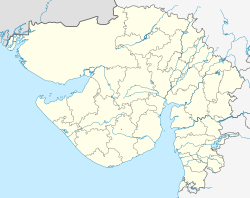Botad
Botad, located in Gujarat's Saurashtra (region), is a significant city and district headquarters of the Botad district. Established as a separate district in 2013, Botad has developed into a key administrative and economic hub, connecting nearby towns and fostering growth across the region. It is about 92 km (57 mi) from Bhavnagar and 133 km (83 mi) from Ahmedabad by road distance.[1] GeographyBotad is situated at a confluence of streams which unite to form a small river, Utavali. In the Gujarati language, it is known as Gatar.[2] Botad is surrounded by low hills on the east and west, forming a valley. Utavali Creek flows through the town, and Madhu Creek joins the Utavali river near Ten Drains. The town is a gateway to Kathiawad (toward Gadhada, Lathi and Amreli), and a crossroads of Gohilwad (towards Bhavnagar), Jhalawad (Limbdi, Surendranagar) and Panchal (towards Paliyad, Vinchiya, Jasdan). DemographicsAccording to the 2011 Indian census, the population of the town of Botad was 130,302 (67,778 men and 62,524 women). Total literacy was 94,563 (53,275 men and 41,288 women). The literacy rate is 83.21 percent, of which male and female literacy was 88.89 percent and 74.60 percent respectively. Botad's overall sex ratio is 922 women per 1,000 men, with a child sex ratio of 874 girls to 1,000 boys. There were a total of 16,654 children (from birth to age six), 8,889 boys, and 7,765 girls (12.78 percent of the municipality's total population).[3] It had a population of 7450 souls according to the census of 1872, which increased to 7755 in 1881.[2] ClimateBotad has a tropical wet-and-dry climate, with a hot, dry summer from mid-March to mid-June and the monsoon (wet) season from mid-June to October (when the average rainfall is 620 millimetres (24 in)). From November to February the weather is mild, with an average temperature of about 20 °C (68 °F) and low humidity. May and June have less rainfall and wind than the post-monsoon period. Thunderstorms are frequent in June and July, and fog is common in winter. Summer temperatures range from 24 to 42 °C (75 to 108 °F), and winter temperatures from 10 to 22 °C (50 to 72 °F).[4] EconomyAgriculture: Botad’s economy is predominantly agrarian, with fertile soil and favorable climate conditions that support the growth of crops like cotton, groundnut, and wheat. The district is part of the Saurashtra cotton belt, contributing significantly to Gujarat’s agricultural output. Industries: Small and medium-scale industries have taken root in Botad, particularly in textile production, chemical manufacturing, and engineering workshops. In recent years, the district’s economic focus has shifted from purely agricultural to include industry, creating diverse employment opportunities. Market and Trade Hub: Botad’s role as a central trade hub is bolstered by its well-established markets. Farmers and traders from surrounding villages bring their produce here for trade. The city’s well-organized markets cater to a wide range of goods, from everyday essentials to agricultural equipment, attracting buyers from across the district. Textile and Retail: Botad also has a burgeoning textile industry, with several small factories and retail shops involved in processing and selling textiles. This adds variety to the local economy and provides additional income avenues for the residents. CultureThe diet in Botad is predominantly vegetarian. Hunting is unpopular, and the city has a variety of fauna. Clothing varies with the seasons and their festivals. Women generally wear the Gujarati type of sari, and men wear kurtas and trousers. Food"Bateka Bhungla" is famous in Botad. Places of interest
Points of Interest in District
SportsCricket is popular in Botad, and during the 1970s and 1980s the town hosted cricket tournaments with teams from Jasdan, Lathi and Bhavanagar. There are sports facilities in Botad is samras academy for cricket and botad district. Popular children's games include moy-dandiya, marbles and kabaddi. EducationBotad has a comprehensive education system that includes both public and private institutions. The public-school system is administered by the state government. Gujarati is the medium of instruction in both public and the majority of private schools. Some primary schools also provide English language instruction. Botad High School was the first high school created after India's independence. The city has several colleges.
TransportBotad is well connected to Ahmedabad, Mumbai, Surat, Vadodara, Bhavnagar, Rajkot and Surendranagar by rail and road. Rail TransportBotad Railway Station: The city has its own railway station, Botad Junction railway station, which is a part of the Western Railway zone. It connects Botad to various important cities in Gujarat and other states. Trains from Botad run to destinations like Ahmedabad, Surat, and Rajkot. Major Stations Nearby: For more extensive rail services, nearby railway stations such as Bhavnagar Terminus railway station and Ahmedabad Junction railway station can be accessed. Air TransportNearest Airport: The nearest airport to Botad is the Bhavnagar Airport, located approximately 55 kilometers away. It has domestic flights connecting to major cities like Mumbai and Ahmedabad. Ahmedabad Airport: For international flights, Sardar Vallabhbhai Patel International Airport in Ahmedabad is the main airport, around 130 kilometers from Botad. Road TransportNational and State Highways: Botad is connected to major national and state highways, facilitating easy travel to cities like Ahmedabad, Bhavnagar, and Surat. The NH 8E runs through the region, offering good connectivity. Buses: The Gujarat State Road Transport Corporation (GSRTC) operates regular bus services from Botad to various cities across Gujarat. Private buses also serve the area, providing additional options for intercity travel. Local Transport: Within the city, auto-rickshaws, cycle-rickshaws, and local taxis are available for short-distance travel. Notable people
Notes and references
|
||||||||||||||||||||||||||||||||||||||||||||||||||||||















